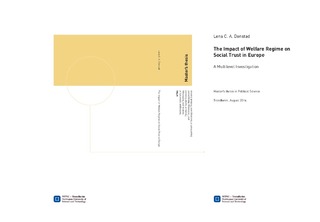The Impact of Welfare Regime on Social Trust in Europe : A Multilevel Investigation
Master thesis
Permanent lenke
http://hdl.handle.net/11250/2356330Utgivelsesdato
2014Metadata
Vis full innførselSamlinger
Sammendrag
Achieving a high level of social trust is a desirable goal for most countries, since social trust
has been considered a key driver of progress, and often goes hand in hand with cooperation
and successful political performance. Social trust is basically a measure of how much
confidence one has in strangers. While a lot of research has been undertaken in order to
examine the benefits of social trust, less attention has been paid to its determinants. The
purpose of this master’s thesis is to shed some light on this issue. There are mainly two broad
schools of thought related to social trust. The first school emphasises that social trust is
something that is influenced by individual characteristics and experiences. However, it has
also been argued that in addition to individual particularities, the structure of the society at
large might have an impact, which is the main idea behind the second school of thought. By
means of multilevel modelling, and by using data from five waves (2002-2010) of the
European Social Survey (ESS), we will be able to study the effect of both individual as well
as contextual factors on social trust simultaneously. One of the main aims of this master’s
thesis is to explore the link between welfare regime and social trust. By using an extended
version of Esping-Andersen’s (1990) threefold welfare regime typology, we will investigate
whether welfare regime could explain some of the variation in social trust among European
citizens. Our results confirm that it is reasonable to continue analysing European countries
grouped into the five different welfare regimes as indicated by our study (social democratic,
conservative, liberal, Mediterranean, and post-communist). The main finding of this master’s
thesis is that even when controlling for a number of other factors, the social democratic
welfare regime still has a very high level of social trust compared with the four other regime
types. As a possible explanation for this, we highlight the differences among the various
welfare regimes concerning access to welfare benefits (policy design) and the various
forms/degrees of stratification that this in turn creates within society. In addition to welfare
regime, our study also demonstrates that a number of individual-level variables should be
viewed as important determinants of social trust.
